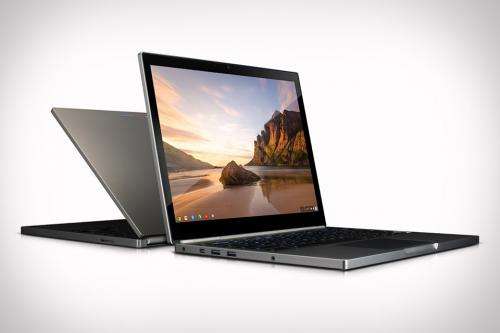Review: Chromebook Pixel is beautiful, but pricey and limited

Intended as a flagship for its Chrome operating system, Google's new Chromebook Pixel feels too much like overkill.
Chrome OS was conceived of as a simple and inexpensive computing platform. The software is built around a Web browser and cloud-based applications; everything you do on a Chrome device is done through a browser window.
Previous Chromebooks were basic and inexpensive. They generally lacked the latest processors and didn't come with any high-end features.
By contrast, offering premium features is the Pixel's reason for being. Its purpose is to show that Chrome doesn't have to be relegated to low-end machines and to inspire Google's partners to expand the range of their Chromebook offerings. Google representatives said the Pixel is their attempt to create a Chromebook that the boss would be proud to take home.
In terms of design, the Google folks have achieved their goal. The Pixel is thinner and lighter than Apple's comparable MacBook Pro, but feels just as sturdy. Like the Apple laptops, the Pixel's case is made from aluminum, not from the plastic found on the less-expensive Chromebooks. The Pixel has sharper edges and is much more rectangular than the MacBook Pros, which gives it a sleek, modern look.
The Pixel takes another page from Apple by including a high-resolution screen similar to Apple's "Retina" display. In fact, the Pixel's screen is even higher resolution than those in Apple's new MacBook Pros. It's beautiful and bright, making text and pictures super-sharp.
But Google has also looked beyond Apple for inspiration. The Pixel features a touch screen like those found in many of the latest Windows laptops. And it includes a powerful Intel Core i5 processor, which is standard fare on Apple and Windows-based notebooks, but is unique for a Chromebook.
The processor makes a difference. While the Samsung Chromebook I recently tested felt sluggish, the Pixel is snappy and responsive, instantly resuming from sleep and quickly switching among tabbed Web pages.
The Pixel also offers some uncommon features. One model includes an LTE radio, which provides a fast Internet connection when you aren't near a Wi-Fi hotspot. That model also includes a limited amount of monthly broadband access from Verizon for two years.
All models of the Pixel come with 1 terabyte of space on the Google Drive cloud storage service for free for three years. That's a bargain, because Google typically charges $50 a month for that much space.
But despite all of its bells and whistles, the Pixel is still a Chromebook and suffers the same limitations as the others.
Because Chrome is designed to run Web-based apps, the operating system lacks many popular PC applications. You won't find Skype, for example, or Photoshop, or many high-end video games. And if you need to use special software for work or to connect to a device in your house, you can almost be certain that software won't be available for Chrome.
That lack of applications means you simply can't do as much with a Chromebook as you can with a Mac or Windows PC. If you're spending only $250 for a basic Chromebook, that shortcoming is acceptable. But it's not when you're spending $1,300, which is the starting price of the Pixel. For that money, you can get a very nice Windows machine or Apple's MacBook Air.
And some of the Pixel's embellishments that help to drive up its price seem unnecessary. The touch screen in particular seems to have little use. Google hasn't redesigned Chrome's interface to take advantage of the touch screen. And unlike some of the new Windows notebooks, the Pixel's screen doesn't detach or fold back on itself, so you can't use the device like a tablet.
While the screen is wonderful, it has one huge drawback: It drains the device's battery. Google says users should see up to five hours of battery life from the Pixel. That's already less than you'd get on many of the latest Mac or Windows laptops. But in my testing, the battery life wasn't even as good as advertised; I got around 4 { hours of use at best.
So while I understand Google's impulse and appreciate the Pixel's design and display, I'm not convinced that anyone yet needs a premium Chromebook.
—-
GOOGLE CHROMEBOOK PIXEL LAPTOP:
-Likes: High-resolution screen; fast processor; solid-feeling aluminum body; sleek, modern design; optional LTE radio; 1 terabyte of free space on Google Drive
-Dislikes: Pricey; lacks access to certain popular PC programs; doesn't take advantage of included touch screen; relatively short battery life.
-Specs: 1.8 GHz, dual-core Intel Core i5 processor; 12.85-inch, 2560 x 1700 pixel screen; 4GB memory.
-Price: $1,300 for Wi-Fi-only model with 32GB storage; $1,450 for model with LTE radio, Wi-Fi and 64GB of storage.
-Web: chromebook.com
More information: Troy Wolverton is a technology columnist for the San Jose Mercury News
(c)2013 San Jose Mercury News (San Jose, Calif.)
Distributed by MCT Information Services




















